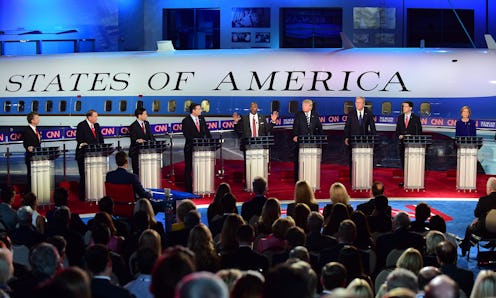News
Can We Actually Change The 14th Amendment?
One of the hottest topics from Wednesday night's GOP debate on CNN was birthright citizenship. Candidates like Donald Trump and Rand Paul, who agreed on little else, became impassioned when speaking about "taking care of" the babies of illegal immigrants. In fact, birthright citizenship is one issue that a large portion of the Republican field stands united on, to some degree, and some of them voiced what they think should be done about it during the debate. GOP candidates want to change the 14th Amendment, which grants anyone born in the United States citizenship, but what exactly would it take to change a Constitutional amendment? A whole lot, it seems.
The 14th Amendment to the U.S. Constitution states:
All persons born or naturalized in the United States, and subject to the jurisdiction thereof, are citizens of the United States and of the State wherein they reside.
The amendment was originally ratified to allow the children of former slaves to become U.S. citizens, but in recent decades, the amendment has been applied to grant citizenship to the children of illegal immigrants, which many Republicans see as an abuse of the Constitution and is in dire need of revision or repeal.
During Wednesday night's debate, Trump repeatedly objected to birthright citizenship. He offered this scenario (as if it were something that's happening on a daily basis):
A woman gets pregnant, she's nine months [pregnant] ... she walks across the border, she has the baby in the U.S., we take care of the baby for 85 years. I don't think so!
Birthright citizenship is such a popular issue among the Republican field that even Paul agreed with Trump in his opposition (someone should check to see if hell froze over). Paul, somewhat begrudgingly, said:
I hate to say it, but Donald Trump has a bit of a point here.
Paul points out that the amendment stretched beyond its original definition.
There's never been a direct Supreme Court case on people who are here illegally, whether their kids are citizens. It hasn't been completely adjudicated.
Even before the debate, other candidates have voice similar opinions on birthright citizenship and the need to change the 14th amendment.
In August, Chris Christie told radio host Laura Ingraham that birthright citizenship should be "reexamined in light of the current circumstances."
[Birthright citizenship] may have made sense at some point in our history, but right now, we need to re-look at all that.
Likewise, Ted Cruz also wants a reexamination, saying on the Michael Medved Show that he "absolutely" supported ending birthright citizenship, though he acknowledged that doing so would be "difficult." And several GOP candidates who were not part of the primetime debate — Rick Santorum, Bobby Jindal, and Lindsey Graham — have also voiced their support for revising the 14th amendment.
So what exactly would it take to change a Constitutional amendment? The short answer is: a lot. Changing the Constitution requires two-thirds of Congress to vote in favor of it, and then three-fourths of the states to ratify it (that's 38 out of 50). That's a tall order, even for a nonpartisan or bipartisan issue, but ending birthright citizenship, a Constitutional amendment that has been in place for nearly 150 years, is much too divisive for such a majority to approve of it.
Two GOP candidates who have wavered on birthright citizenship include Scott Walker and John Kasich. In the span of one week, Walker went from fully supporting ending the practice to opposing the repeal of the 14th amendment. He told ABC's George Stephanopoulos:
My point is, any discussion that goes beyond securing the border and enforcing the laws are things that should be a red flag to voters out there.
While Walker's change of stance is clearly motivated by not alienating voters rather than personal convictions, Kasich offered a more insightful explanation for his own change of heart. He told CNN's Dana Bash in an interview he realized the issue was too polarizing for the country:
I think we need to get over that. I'm not for it anymore. Let these people who are born here be citizens and that's the end of it. I don't want to dwell on it.
